One of the things that turned me off to the book “The Four Hour Body” was that the author claimed a calorie wasn’t just a calorie. Basically, that you can’t eat a low-calorie diet of whatever you want and lose weight.
The reason I disagreed with this was because it worked for me. In order to lose over 100 pounds I counted all of my calories every day–including liquid calories, the butter on my toast, EVERYTHING. It worked! I started to lose weight and was so happy that I was finally seeing results, I continued to count my calories.
Even now, after almost 3 years of maintaining my 110 pound weight loss, I still count my calories.
When I was first losing weight there were many times I would save about 300 calories for dessert at the end of the day. Giving up sweets entirely was something I couldn’t do, so I always made sure that I had enough calorie wiggle-room to enjoy a treat. There were several times I’d eat two Rice Krispie treats instead of just one (180 calories for the two) simply because I had the extra calories!
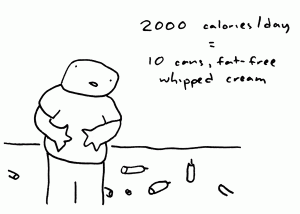
I never felt like I was restricting myself of anything because in MY world: A CALORIE WAS A CALORIE. Whether or not it’s a calorie from an apple, a piece of chocolate or bread, it was 70 calories across the board no matter what.
This book claims that it’s not that way. Since I saw results with MY way, I’m not sure if I believe that a calorie is not a calorie…
The following was taken (word for word) from the book “The 4 Hour Body.”
WHY A CALORIE ISN’T A CALORIE
“Calories are all alike, whether they come from beef or bourbon, from sugar or starch, or from cheese and crackers. Too many calories are just too many calories.” — Fred Stare, founder and former chair of the Harvard University Nutrition Department.
The above statement is so ridiculous as to defy belief, but let’s take a look at the issue through a more rational lens: hypothetical scenarios.
Scenario #1: Two male identical twins eat the exact same meals for 30 days. The only difference: one of the subjects just finished a strong course of antibiotics and now lacks sufficient good bacteria for full digestion.
Will the body composition outcomes be the same?
Of course not. It’s not what you put in your mouth that matters, it’s what makes it to your bloodstream. If it passes through, it doesn’t count.
The creator of the “calorie” as we know it, 19th century chemist Wilbur Olin Atwater, did not have the technology that we have today. He incinerated foods. Incineration does not equal human digestion; eating a fireplace log will not store the same number of calories as burning one will produce. Tummies have trouble with bark, as they do with many things.
Scenario #2: Three females of the same race, age, and body composition each consume 2,000 calories daily for 30 days. Subject 1 consumes nothing but table sugar, subject 2 consumes nothing but lean chicken breast, and subject 3 consumes nothing but mayonnaise (2,000 calories is just 19.4 tablespoons, if you care to indulge).
Will the body composition outcomes be the same?
Of course not. The hormonal responses to carbohydrates protein and fat are different.
There is no shortage of clinical studies to prove that beef calories do not equal bourbon calories.
One such study, conducted by Kelwick and Pawan, compared three groups put on calorically equal semi-starvation diets of 90% fat, 90% protein, or 90% carbohydrate. Through ensuring compliance was a challenge, the outcomes were clearly not all the same.
1,000 cals at 90% fat = weight loss of .9 lbs per day
1,000 cals at 90% protein = weight loss of .6 lbs per day
1,000 cals at 90% carbohydrate = weight gain of .24 lbs per day
Different sources of calories = different results.
Things that affect calorie allocation — and that can be modified for fat-loss and muscle gain — include digestion, the ratio of protein-to-carbohydrates-to-fat, and timing.”
And then I started running a few years ago and my opinions changed in terms of food science. I still believed in calorie counting but I did change my mind in terms of FUEL. I started looking at food as fuel to propel my body forward when running. If I ate the right foods, the right combinations of foods I had energy and strength. It was one of the reasons I stopped being a vegetarian! I was working out a lot, I was running a lot and I was craving protein.
I started to learn that if I ate an apple with peanut butter before I worked out in the gym, I wouldn’t be hungry. If I had chocolate milk with protein powder after lifting weights, I’d be less sore. If I ate a carb-heavy dinner the night before a long run, I’d have much more energy and speed. Food science really does work and it changed how I looked at eating for fuel.
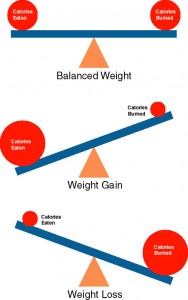
So now I’m faced with the question: is a calorie just a calorie? Could I eat only 1500 calories of ice cream a day and nothing else and maintain my weight loss? Or lose weight? Probably not. I do think calories from protein, fiber or carbs are way different than sugar calories. In that way, not all calories are equal.
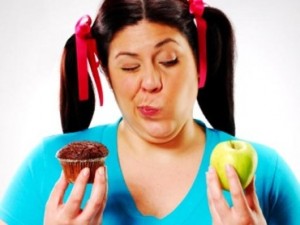
Will this change how I eat or track my food? Probably not. I will still count calories, I will eat what makes my body happy and try to limit sugar intake but still enjoy treats once in awhile. What I did to lose weight worked; and what I’ve been doing to keep the weight off works too.
Now on to the experiment….!
QUESTION: Do you think a calorie is a calorie?
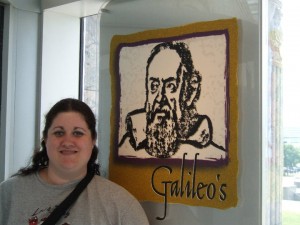

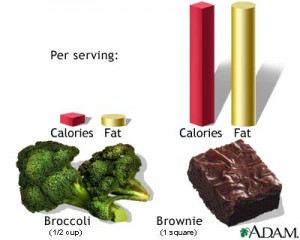
Lori
This is a tough one. I have found through personal experience that I can eat more calories and maintain with a higher fat, moderate protein, low-moderate carb (100 grams of carbs) diet than a low calorie, low fat diet. It’s not a huge margin, maybe 200-300 calories per day more.
I also find I am much more satisfied with the fat calories, so there is less inclination to nibble. I think it is harder for me to stick within a calorie range if there is a lot of ’empty’ calories making up that portion.
However, I can’t just eat tons of calories of all protein or fat and not gain weight.
I have always wondered if it isn’t the calories so much as how the body processes the calories. I think my body will more efficiently use protein and fat calories for what it needs, where maybe it tends to store carb calories. More like stoking a furnace. That’s just me, though.
Again – this book was written by a younger man. Someone like that can eat junk food and still lose weight. Any change he makes will show up on the scale, whereas for a lot of women it shows very little difference (unless you were starting out from the beginning again).
I am really curious as to how this will go for you. I am sure you will lose some weight during the week.
Lisa Eirene
And I’ve never done any “diet experiments.” I just limited my calories, exercised and lost weight. I didn’t try different combinations of foods to see if I’d lose more or lose faster. It was what it was and I was okay with it.
This week of no sugar/candy/treats I’ve noticed that I’ve been hungrier than normal. I’ve been eating a lot of high fiber/high protein meals and yet I’m still hungry. I found that odd. I think you might be right about the fat. I need more in my diet. But not in a bad way (like I should be adding avocados to salads and such).
I am curious about how this experiment will work for me. I honestly am slightly terrified that I will GAIN weight….
Carbzilla
I do not believe that a calorie is a calorie because of the way the body processes nutrients. It’s just more complicated than that. There are so many variables. I see it every week at Weight Watchers where we’re eating the same points and losing so differently. That said, I’ve lost weight eating better and worse, but I know I feel better when I eat better. 🙂
Lisa Eirene
I think sugar calories are way different. But I’m still a little skeptical about this whole thing!
Coco
Hmmm. I like your point about how our bodies process/metabolize different foods/calorie sources differently.
Regardless of whether a calorie is a calorie for “energy balance” purposes, the type of food you eat certainly has an impact on how satisfied you are — or how miserable you are. I focus on getting more nutritional/taste “bang for my buck” out of my food choices and can be satisified hunger-wise and taste-wise on fewer calories with more “whole food” choices.
Lisa Eirene
I’ve never tried an experiment eating different types of food for specific reasons so I have no idea how my body will feel on this (yet).
John
No I don’t. It’s well known that it takes energy to process protein, so I think that about 20 percent of the energy of protein gets used up in the process. That means that because I’m having a lot of protein at the moment, my energy intake is actually less than it is if you totaled all the numbers.
Fat, carbohydrates and protein are all converted into human fat. Converting these chemicals takes energy, and in cases may release energy (ie exothermic reaction). It’s not a one step process. A -> B -> C. Taking Chemistry taught me that some of the time, C -> B then back again to C. Enzymes speed up reactions. It’s all very complicated.
However, the reality of things is that, yes, to a degree, a calorie is pretty much a calorie, give or take a bit. As much as a person owning their own body and eating food cares. People don’t eat 90% of one type of protein/fat/carbohydrate.
blackhuff
All calories are different – you get bad or good calories.
Sugary calories are the bad ones and fruit are the good ones because like you say, they contain fiber and nutrients as well. What nutrients do a sugary treat have? None.
M iz
it sounds crazy but I can totally recall the day I realized all this too.
it was such a LIGHTBULB and life changing moment for me
(and muscle tone changing :))
Miz.
Lisa Eirene
I hope I see some changes that make it worth it!
Tom
You simplify the 4HB a bit though. Ferriss is much more about the types of food you eat, and emphasizes getting nutrient dense food in your system. there is also a concentration on beans and green veggies as your source of carbs, because of the low glycemic load they just keep giving and giving, as opposed to some Ben and Jerry’s which will spike your insulin and give you a rush then crash you down hard.
But different people lose differently as well. I have been on the 4HB diet now for three weeks and easily dropped 16 pounds and counting. Plus never hungry and lots of energy. And I get a cheat day every Saturday that is fun and does not affect overall weight, in fact helps to break any metabolic monotony and gets the weight going down again the following week.
Lisa Eirene
In all honesty I was offended by most of the book so I didn’t read it all. Michael read it all and took notes to prepare for the diet plan. I’m going to defer to him for details.
How much did you have to lose when you started the diet? How close are you to your goal now?